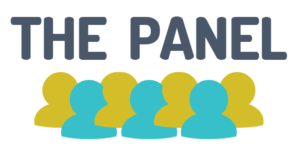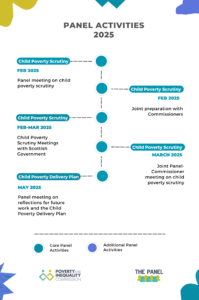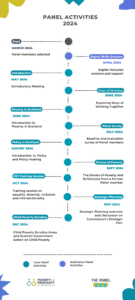This page details the Commission’s Experts by Experience Panel that was established in March 2024. Details and learning from the Commission’s first Experience Panel, which ran from August 2021 to June 2023, can be found here: Learning from the Commission’s Experts by Experience Panel 2021 – 23
The Panel
In March 2024, the Commission established an Experts by Experience Panel (‘the Panel’). When we say ‘experts by experience’ in relation to the Panel, we mean people who have current or very recent lived experience of poverty.
The Panel has been established to embed participation in the work of the Commission and to ensure that those with lived experience of poverty are engaged in all aspects of the Commission’s work – advice, scrutiny and advocacy.
The Panel is made up of 12 experts by experience who are:
- based across Scotland, in cities, towns and rural areas.
- diverse in terms of their identity and their experiences of poverty and inequality.
- from groups most likely to experience poverty in Scotland.
Prioritising Lived Experience in the Commission
As part of its Strategic Plan 2020-2023, the Commission’s over-arching strategic priority was to:
“Amplify the voices of experts by experience to make sure they are part of identifying issues, developing and designing solutions, and scrutinising progress.”
In 2020, in order to develop an approach to involving ‘experts by experience’ in its work, the Commission funded the Poverty Alliance and the Scottish Poverty and Inequality Research Unit (SPIRU) to co-produce guidance with a group of experts by experience. This guidance set out a range of principles, recommendations and practical steps that the Commission could take forward to meaningfully engage experts by experience in its work. Informed by this guidance, the Commission committed to working alongside a Panel of experts by experience, ensuring they are involved in all key parts of the Commission’s work.
How does the Panel work?
Panel members have a core Panel meeting once every six weeks, usually online, and members will meet more frequently to work on urgent or complex issues.
Panel members work together and with Commissioners to identify issues, and to develop advice and scrutiny around poverty and inequality. Panel members have agreed Terms of Reference and developed a Group Agreement. The Terms of Reference document outlines the purpose of the Panel, the details of membership, the roles of Panel members and the Commission, and ways of working. The Group Agreement outlines how Panel members, members of the Secretariat and Commissioners work together in a group context.
In developing its approach with this Panel, the Commission is taking forward learning from the first iteration of the Panel, including that from our former Panel members.
The Panel so Far – Activities 2024 and 2025
Panel Recruitment
To recruit Panel members, we worked in partnership with local groups, organisations and practitioners from across Scotland. With support from Disability Equality Scotland, we developed accessible recruitment materials including leaflets, a video, presentation materials, social media content, and application forms.
We worked with partner groups and organisations to identify experts by experience who would be interested in joining the Panel and also worked with partners who could provide support to people who want to join the Panel. We invited people who are interested to apply online, by post or on the phone.
Why lived experience?
We asked members from the first iteration of our Panel why people with lived experience of poverty should be involved in decisions and actions to tackle poverty in Scotland. You can watch this short video (2 mins) to see what they said.
Video transcript:
We asked our Panel members from the first iteration of our Panel why it is important to involve people with lived experience in decisions about poverty and inequality.
This is what they told us…
- They are experts in their own way and it’s important that decisions consider these invaluable experiences, and learn from them, to improve the situation for everyone.
- We can tell exactly what we are living in, and what we might need to make life easier, without worrying where the next meal comes from.
- So that the government can find out from the people who live through poverty on a daily basis what they go through, [and] can try make changes to get families and everyone else out of poverty.
- They can give first hand experience of their hardships, and the things they would like changed, that would improve their lives financially and otherwise.
- In the hope it will open closed doors to help others trapped in social deprivation.
- The only way to reduce poverty is to understand lived experience. If you are making decisions without consulting the people in question well what is the point?
- Because to make a genuine effective change, you need people that have experience in poverty and inequality to provide necessary advice and opinions.
- People who have experience of poverty know what the issues are that caused them to fall into hardship.
- Only they can truly understand the issues facing people living with poverty and inequality. They will be able to speak authoritatively about the experience they had.
- There is too much misinformation. People need to know the truth of poverty.
- There are the people who are in the know about what poverty and inequality is, they are ones who can talk on how it could be reduced.
- People with lived experience are the experts. Their voices need to be heard to ensure any decisions made are the right decisions.
Thanks to our former Panel members for sharing their thoughts.
For more information
If you have any questions, or would like any further information about the Panel, please contact Orlaith McAree on orlaith.mcaree@povertyinequality.scot.


